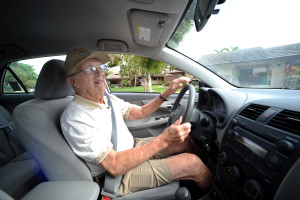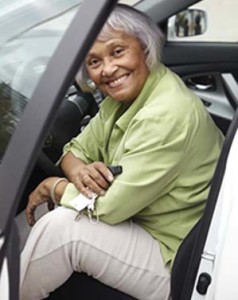With an aging population, it is becoming more commonplace for drivers to reach their late 70’s and 80’s and still continue to drive. This is not a problem if the person’s driving is skillful and they are alert enough to avoid violating any of the multitude of vehicle code rules and regulations and stay free of any accidents.
These are some of the things to look for when you assess your loved one’s driving skills.
1. Braking and accelerating smoothly.
2. Abrupt lane changes with or without signals.
3. Reactions to changes in their driving environment.
4. Drifting into other lanes.
5. Does the driver tire easily is a big question.
6. Difficulty reading traffic signals or signage.
7. Uses and/or cancels their turn signals without any reason.
8. Driving too slowly or too fast.
9. Not checking before lane changes and pulling out from the curb and running into the curb or over the curb.
10. Difficulty turning to look over his/her shoulder due to injury or just old age.
11. Not paying attention to traffic signs, traffic signals, pedestrians or bicycles.
12. Not paying attention to reactions of other drivers.

You should evaluate all of your observations and concerns and make a list of them so that this checklist that is provided above can be discussed with other family members. It is best to try to get all of your family members to support your effort to either reduce or prevent the elder driver from continuing to endanger him or herself and members of the public. If medications are a factor, then it is a good idea to check with the pharmacist or a geriatric specialist to see if any of these medications may have an adverse effect on your loved one’s driving ability.
We recommend that you start early with this process. Preferably, have conversations about safe driving long before the driving becomes a problem. The establishment of open dialogue allows time for the elder adult driver to consider his/her driving skills and make the appropriate modifications on their own without the added pressure of being told “what to do.” Nobody likes to be told what to do especially respected elders who may have held very responsible positions in industry law or medicine.
It is a good idea to choose which family spokesperson should do the talking since some members of the family may garner more respect. Hearing sensitive and personal information from the “right person” can make a very big difference to the elderly adult driver. To increase the chance of success with the limitation of driving or the cessation of driving, please carefully select the person who is going to initiate the discussion. It is important that the person chosen is someone who the elder adult driver really trusts and respects.
How to start the conversation? One way would be to begin with letting the elder driver know that you have genuine concerns about his/her safety and that you love them so much that you want them to be safe at all times and you want others to be safe too. Always offer help and support. Always suggest that you will answer any questions they may have an be there for their ultimate decision.
Here are some helpful tips that you can give to help the elder driver:
1. Suggest traffic routes that are less demanding and torturous. We all know there are bad roads and horrible interchanges that make driving a nightmare so start off with a joke or some sort of light conversation without getting heavy and serious.

Here are some other suggestions since I have had to do through this with a loved one too:
1. Suggest limiting driving or not driving at all during the nighttime.
2. Suggest driving during the day when the traffic is light, especially at certain intervals after and before rush hour.
3. Suggest avoiding certain difficult intersections and segments of the highway that are prone to accidents. This will appear to be a loving gesture.
4. Suggest driving for shorter distances or limiting driving to just the essential places.
These are just a few of the tips that can really make a bit difference in the quality of life for the elder driver that you love and cherish and which will ultimately yield results.
Our law firm has represented many senior and elder drivers at all types of DMV Hearings, so please feel free to give us a call at 707-571-8600 OR 760-832-6118 today!
SANTA ROSA OFFICE
182 Farmers Lane, Suite 100A
Santa Rosa, CA 95405
Phone: 707-571-8600
Fiumara Law, PC, with our main office in Santa Rosa, we serve clients in Sonoma County, Marin County and throughout Northern California.

Palm Springs Office
2793 E Morongo TRL
Palm Springs, CA 92264
Phone: (760) 832-6118
© 2023 by Fiumara Law, PC. All rights reserved.
